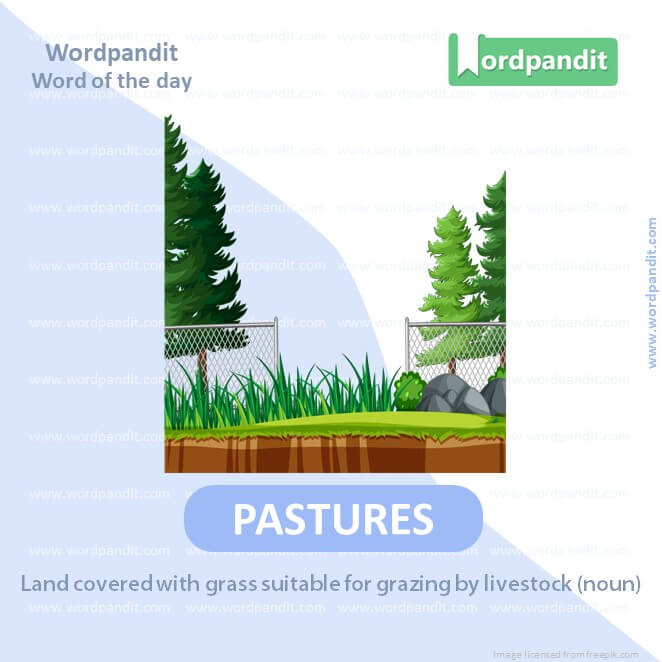Daily Vocabulary Words: List of Daily Used Words in Leading Indian Newspapers
Hi there. Welcome to this special section @ Wordpandit. Our endeavour here is straightforward: highlighting daily vocabulary words that you would come across in leading newspapers in the country. We have included the following newspapers in our selection:
• The Times of India
• The Economic Times
• Hindustan Times
• Mint
• Indian Express
We are putting in extensive work to develop your vocabulary. All you have to do is be regular with this section and check out this post daily. This is your repository of commonly used words; essentially, we are posting a list of daily used words. Hence, this has significant practical application as it teaches you words that are commonly used in leading publications mentioned above.
Visit the website daily to learn words from leading Indian newspapers.

WORD-1: FAUCET
CONTEXT: If you’re in need of a good plumber to come and fix a leaky faucet or a defective flush, or a reliable electrician to sort out the wiring that keeps short-circuiting the bijli, or a carpenter to repair a broken sofa, your search is likely to prove frustrating, for such skilled workers have become a species almost as extinct as the dodo.
SOURCE: The Times of India
EXPLANATORY PARAGRAPH: Imagine you’re thirsty and you want some water. You go to the sink, and there’s a handle there. When you turn it, water comes out! That handle and the spout where the water flows is called a faucet.
MEANING: A device from which water flows, usually in sinks or tubs (noun).
PRONUNCIATION: FAW-sit
SYNONYMS: Tap, spigot, valve, spout, fixture, water tap, outlet
USAGE EXAMPLE:
1. Can you turn off the faucet? It’s dripping.
2. The new kitchen has a modern faucet design.
3. I need to replace the old faucet in the bathroom.
4. Don’t leave the faucet running; it’s a waste of water.

WORD-2: EXTINCT
CONTEXT: If you’re in need of a good plumber to come and fix a leaky faucet or a defective flush, or a reliable electrician to sort out the wiring that keeps short-circuiting the bijli, or a carpenter to repair a broken sofa, your search is likely to prove frustrating, for such skilled workers have become a species almost as extinct as the dodo.
SOURCE: The Times of India
EXPLANATORY PARAGRAPH: Dinosaurs are huge creatures that lived a long, long time ago. But we don’t see them around anymore, do we? That’s because they are extinct, which means they aren’t alive anywhere in the world now.
MEANING: No longer in existence or living (adjective).
PRONUNCIATION: ik-STINKT
SYNONYMS: Vanished, disappeared, dead, gone, defunct, lost
USAGE EXAMPLE:
1. The dodo bird is an extinct species.
2. Many ancient languages have become extinct.
3. We must protect endangered animals before they become extinct.
4. The volcano has been extinct for thousands of years.

WORD-3: EN MASSE
CONTEXT: For it seems that all the experienced plumbers, electricians, and carpenters, along with a great many trained cooks and other domestic helpers, have migrated en masse to greener pastures in the Gulf, or in parts of the world, where their expertise is more highly regarded and better rewarded.
SOURCE: The Times of India
EXPLANATORY PARAGRAPH: Imagine a big group of birds all flying together in the sky. They’re moving all at once, like one big group. That’s what we call “en masse” – when a lot of things or people do something all together.
MEANING: All together; as a group (adverb).
PRONUNCIATION: on MASS
SYNONYMS: Together, as one, collectively, all at once, in a body, in a group, simultaneously
USAGE EXAMPLE:
1. The students protested en masse against the new rule.
2. The audience stood up en masse to applaud.
3. The employees resigned en masse after the announcement.
4. Birds migrated en masse to warmer regions.

WORD-4: PASTURES
CONTEXT: For it seems that all the experienced plumbers, electricians, and carpenters, along with a great many trained cooks and other domestic helpers, have migrated en masse to greener pastures in the Gulf, or in parts of the world, where their expertise is more highly regarded and better rewarded.
SOURCE: The Times of India
EXPLANATORY PARAGRAPH: Imagine a big open field with lots of green grass. Cows
or sheep might be eating that grass and playing there. This field with green grass for animals to eat and roam is called a pasture.
MEANING: Land covered with grass suitable for grazing by livestock (noun).
PRONUNCIATION: PASS-churz
SYNONYMS: Meadows, fields, grasslands, grazing lands, leas, paddocks
USAGE EXAMPLE:
1. The cows grazed happily in the open pastures.
2. We own 50 acres of rich pastures.
3. Sheep are often seen in the highland pastures.
4. Wild horses roamed the vast pastures.

WORD-5: DEARTH
CONTEXT: So while we have lots – some would say too many – property dealers, and marketing consultants, and insurance salespeople, and others in the service sector which has become the largest contributor to the national economy, there is a dearth of workers accomplished in manual tasks.
SOURCE: The Times of India
EXPLANATORY PARAGRAPH: Imagine you have a big box of crayons, but you can’t find any blue ones. There’s a lack of blue crayons, right? When there’s a lack or not enough of something, that’s called a dearth.
MEANING: A scarcity or lack of something (noun).
PRONUNCIATION: DURTH
SYNONYMS: Shortage, scarcity, lack, deficiency, paucity, insufficiency
USAGE EXAMPLE:
1. There’s a dearth of fresh vegetables in winter.
2. The city experienced a dearth of clean drinking water.
3. The company faced a dearth of skilled workers.
4. There was a dearth of information on the topic.
WORD-6: STELLAR
CONTEXT: Isro is on a roll-roll. Chandrayaan-3 having made light work of the dark side of the Moon, our stellar scientists launched Aditya L1 last Sunday to study the solar atmosphere.
SOURCE: The Times of India
EXPLANATORY PARAGRAPH: Think of the night sky full of twinkling stars. Stars are beautiful and bright, right? When something is as awesome as a star, we say it’s “stellar.”
MEANING: Of or relating to stars; exceptionally good. (adjective)
PRONUNCIATION: STEL-lar
SYNONYMS: Starry, astronomical, outstanding, exceptional, superb, top-notch
USAGE EXAMPLES:
1. She gave a stellar performance in the play.
2. The movie received stellar reviews from critics.
3. The telescope offers a stellar view of the galaxy.
4. His recent book has been a stellar success.
WORD-7: LEVERAGING
CONTEXT: At a time when the world is becoming more divided, India is leveraging its G20 presidency to build consensus on issues that transcend national borders.
SOURCE: The Times of India
EXPLANATORY PARAGRAPH: Imagine you use a see-saw to lift something heavy. It helps you, right? Leveraging is like using something you have to get a better result or advantage in a situation.
MEANING: Using something to maximum advantage. (verb)
PRONUNCIATION: LEV-er-ij-ing
SYNONYMS: Capitalizing, exploiting, utilizing, employing, harnessing, making use of
USAGE EXAMPLES:
1. She’s leveraging her connections to find a job.
2. Companies are leveraging technology to improve services.
3. By leveraging his expertise, he secured a promotion.
4. We are leveraging data to make informed decisions.
WORD-8: CONSENSUS
CONTEXT: At a time when the world is becoming more divided, India is leveraging its G20 presidency to build consensus on issues that transcend national borders.
SOURCE: The Times of India
EXPLANATORY PARAGRAPH: Imagine you and your friends are deciding on a game to play. After talking, everyone agrees on playing hide and seek. When everyone agrees like that, it’s called a consensus.
MEANING: General agreement among a group of people. (noun)
PRONUNCIATION: kuhn-SEN-sus
SYNONYMS: Agreement, unanimity, accord, harmony, concord, concurrence
USAGE EXAMPLES:
1. The team reached a consensus on the project’s direction.
2. The consensus among experts is that the method is effective.
3. It’s challenging to achieve consensus in large groups.
4. The community reached a consensus about the park’s renovation.
WORD-9: TRANSCEND
CONTEXT: At a time when the world is becoming more divided, India is leveraging its G20 presidency to build consensus on issues that transcend national borders.
SOURCE: The Times of India
EXPLANATORY PARAGRAPH: Imagine you’re jumping over a big wall that others couldn’t. You went beyond what others did! When you go beyond or do better than something, it’s called “transcend.”
MEANING: Go beyond the limits or surpass in quality or achievement. (verb)
PRONUNCIATION: tran-SEND
SYNONYMS: Exceed, surpass, outdo, outstrip, eclipse, overstep
USAGE EXAMPLES:
1. His knowledge transcends traditional learning.
2. The new technology transcends all expectations.
3. She aims to transcend the achievements of her peers.
4. Music has the power to transcend cultural boundaries.
WORD-10: GALVANISE
CONTEXT: At a time when the world is becoming more divided, India is leveraging its G20 presidency to build consensus on issues that transcend national borders.
SOURCE: The Times of India
EXPLANATORY PARAGRAPH: Think of a superhero suddenly jumping into action because something important happens. When someone or something suddenly pushes you to act or change, that’s called “galvanise.”
MEANING: Stimulate into sudden activity or alertness. (verb)
PRONUNCIATION: GAL-vuh-nize
SYNONYMS: Stimulate, energize, inspire, motivate, excite, rouse
USAGE EXAMPLES:
1. The speech galvanized the crowd into action.
2. The incident galvanized the community to demand change.
3. His words galvanized the team to work harder.
4. The news galvanized investors to sell their shares.
Vocabulary SSC
The Staff Selection Commission (SSC) examinations place significant weightage on the English Language section, making ‘vocabulary SSC’ one crucial aspect to ace. ‘Vocabulary SSC’ corresponds to grasping a wide range of words and their meanings, thereby strengthening one’s English language performance for the SSC exams. A structured and mindful approach can ensure effective learning of ‘vocabulary SSC’.
The first and principal step in learning ‘vocabulary SSC’ is to familiarize oneself with the words often asked in these exams. SSC repeated word lists available online or in preparation books can serve as a good starting point. Start with a manageable number of words daily, ensuring that you understand the meaning and usage of each word.
To be successful in ‘vocabulary SSC’, it’s important to use new vocabulary in sentences. This can be done in daily conversations, or through writing exercises like essays or letters based on previous SSC exam topics. Doing this can help deepen your understanding of words and their contexts.
Another critical method of mastering ‘vocabulary SSC’ is through regular revision. Flashcards can be an invaluable tool for this. Write the word on one side and its meaning on the other. Revise these cards daily to reinforce your memory of the words.
In learning ‘vocabulary SSC’, solving previous years’ question papers can be beneficial. This practice can familiarize you with the pattern of words asked, their frequency, and test your understanding over time.
To conclude, ‘vocabulary SSC’ is an essential part of SSC exam preparations. A balanced approach involving regular learning, usage, revisions and solving past question papers will create a strong foundation for the ‘vocabulary SSC’. The journey might seem arduous initially, but with dedication and discipline, mastering ‘vocabulary SSC’ is definitely achievable, paving the path for excellent SSC exam scores.













